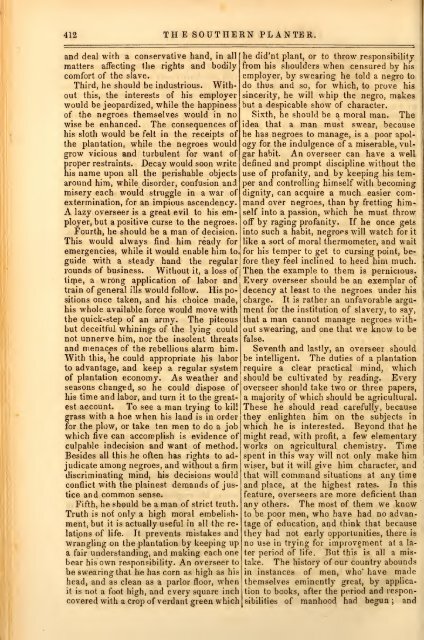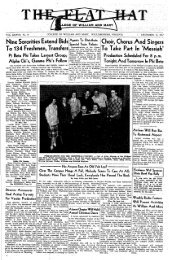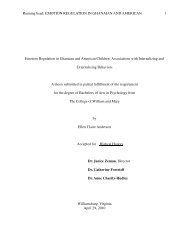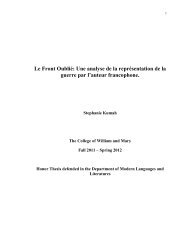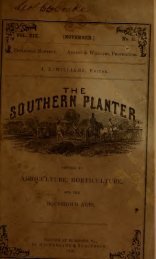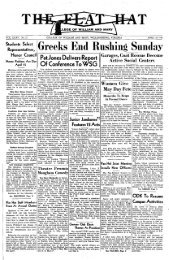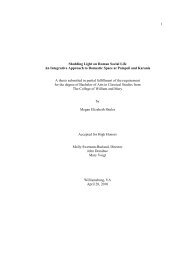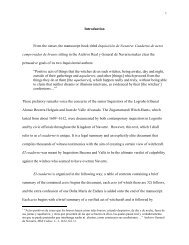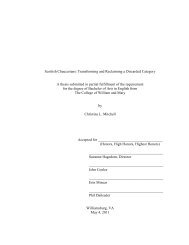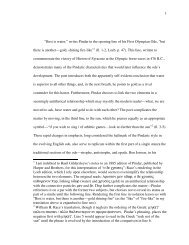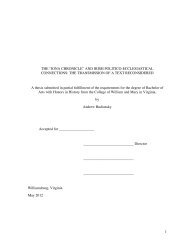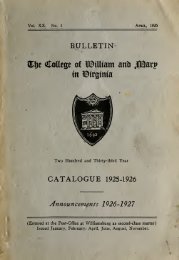Southern planter : devoted to agriculture, horticulture, and the ...
Southern planter : devoted to agriculture, horticulture, and the ...
Southern planter : devoted to agriculture, horticulture, and the ...
You also want an ePaper? Increase the reach of your titles
YUMPU automatically turns print PDFs into web optimized ePapers that Google loves.
412 THE SOUTHERN PLANTER,<br />
<strong>and</strong> deal with a conservative h<strong>and</strong>, in all<br />
matters affecting <strong>the</strong> rights <strong>and</strong> bodily<br />
comfort of <strong>the</strong> slave.<br />
Third, he should be industrious. Without<br />
this, <strong>the</strong> interests of his employer<br />
would be jeopardized, while <strong>the</strong> happiness<br />
of <strong>the</strong> negroes <strong>the</strong>mselves would in no<br />
wise be enhanced. The consequences of<br />
his sloth would be felt in <strong>the</strong> receipts of<br />
<strong>the</strong> plantation, while <strong>the</strong> negroes would<br />
grow vicious <strong>and</strong> turbulent for want of<br />
proper restraints. Decay would soon write<br />
his name upon all <strong>the</strong> perishable objects<br />
around him, while disorder, confusion <strong>and</strong><br />
misery each would struggle in a war of<br />
extermination, for an impious ascendency.<br />
A lazy overseer is a great evil <strong>to</strong> his employer,<br />
but a positive curse <strong>to</strong> <strong>the</strong> negroes.<br />
Fourth, he should be a man of decision.<br />
This would always find him ready for<br />
emergencies, while it would enable him <strong>to</strong>,<br />
guide with a steady h<strong>and</strong> <strong>the</strong> reguli<br />
rounds of business. Without it, a loss of<br />
tirpe, a wrong application of labor <strong>and</strong><br />
train of general ills would follow. His positions<br />
once taken, <strong>and</strong> his choice made,<br />
his whole available force would move with<br />
<strong>the</strong> quick-step of an army. The piteous<br />
but deceitful whinings of <strong>the</strong> lying could<br />
not unnerve him, nor <strong>the</strong> insolent threats<br />
<strong>and</strong> menaces of <strong>the</strong> rebellious alarm him.<br />
With this, he could appropriate his labor<br />
<strong>to</strong> advantage, <strong>and</strong> keep a regular system<br />
of plantation economy. As wea<strong>the</strong>r <strong>and</strong><br />
seasons changed, so he could dispose of<br />
his time <strong>and</strong> labor, <strong>and</strong> turn it <strong>to</strong> <strong>the</strong> great-<br />
est account. To see a man trying <strong>to</strong> kill<br />
grass with a hoe when his l<strong>and</strong> is in order<br />
for <strong>the</strong> plow, or take ten men <strong>to</strong> do a job<br />
which five can accomplish is evidence of<br />
culpable indecision <strong>and</strong> want of method.<br />
Besides all this he often has rights <strong>to</strong> adjudicate<br />
among negroes, <strong>and</strong> without a firm<br />
discriminating mind, his decisions would<br />
conflict with <strong>the</strong> plainest dem<strong>and</strong>s of justice<br />
<strong>and</strong> common sense.<br />
Fifth, he should be a man of strict truth.<br />
Truth is not only a high moral embelifihment.<br />
but it is actually useful in all <strong>the</strong> relations<br />
of life. It prevents mistakes <strong>and</strong><br />
wrangling on <strong>the</strong> plantation by keeping up<br />
a fair underst<strong>and</strong>ing, <strong>and</strong> making each one<br />
bear his own responsibility. An overseer <strong>to</strong><br />
be swearing that he has corn as high as his<br />
head, <strong>and</strong> as clean as a parlor floor, w^hen<br />
it is not a foot high, <strong>and</strong> every square inch<br />
covered with a crop of verdant green which<br />
he did'nt plant, or <strong>to</strong> throw responsibility<br />
from his shoulders when censured by his<br />
employer, by swearing he <strong>to</strong>ld a negro <strong>to</strong><br />
do thus <strong>and</strong> so, for which, <strong>to</strong> prove his<br />
sincerity, he will whip <strong>the</strong> negro, makes<br />
but a despicable show of character.<br />
Sixth, he should be a moral man. The<br />
idea that a man must swear, because<br />
he has negroes <strong>to</strong> manage, is a poor apology<br />
for <strong>the</strong> indulgence of a miserable, vulgar<br />
habit. An overseer can have a well<br />
defined <strong>and</strong> prompt discipline without <strong>the</strong><br />
use of profanity, <strong>and</strong> by keeping his temper<br />
<strong>and</strong> controlling himself with becoming<br />
dignity, can acquire a much easier comm<strong>and</strong><br />
over negroes, than by fretting himself<br />
in<strong>to</strong> a passion, which he must throw<br />
off by raging profanity. If he once gets<br />
in<strong>to</strong> such a habit, negroes will watch for it<br />
like a sort of moral <strong>the</strong>rmometer, <strong>and</strong> wait<br />
for his temper <strong>to</strong> get <strong>to</strong> cursing point, before<br />
<strong>the</strong>y feel inclined <strong>to</strong> heed him much.<br />
Then <strong>the</strong> example <strong>to</strong> <strong>the</strong>m is pernicious.<br />
Every overseer should be an exemplar of<br />
decency at least <strong>to</strong> <strong>the</strong> negroes under his<br />
charge. It is ra<strong>the</strong>r an unfavorable argument<br />
for <strong>the</strong> institution of slavery, <strong>to</strong> say,<br />
that a man cannot manage negroes without<br />
swearing, <strong>and</strong> one that we know <strong>to</strong> be<br />
false.<br />
Seventh <strong>and</strong> lastly, an overseer should<br />
be intelligent. The duties of a plantation<br />
require a clear practical mind, which<br />
should be cultivated by reading. Every<br />
overseer should take two or three papers,<br />
a majority of which should be agricultural.<br />
These he should read carefully, because<br />
<strong>the</strong>y enlighten him on <strong>the</strong> subjects in<br />
which he is interested. Beyond that he<br />
might read, with profit, a few elementary<br />
works on agricultural chemistry. Time<br />
spent in this way will not only make him<br />
wiser, but it will give him character, <strong>and</strong><br />
that will comm<strong>and</strong> situations at any time<br />
<strong>and</strong> place, at <strong>the</strong> highest rates. In this<br />
feature, overseers are more deficient than<br />
any o<strong>the</strong>rs. The most of <strong>the</strong>m we know<br />
<strong>to</strong> be poor men, who have had no advantage<br />
of education, <strong>and</strong> think that because<br />
<strong>the</strong>y had not early opportunities, <strong>the</strong>re is<br />
no use in trying for improvement at a later<br />
period of life. But this is all a mistake.<br />
The his<strong>to</strong>ry of our country abounds<br />
in instances of men, who' have made<br />
<strong>the</strong>mselves eminently great, by application<br />
<strong>to</strong> books, after <strong>the</strong> period <strong>and</strong> responsibilities<br />
of manhood had begun : <strong>and</strong>


